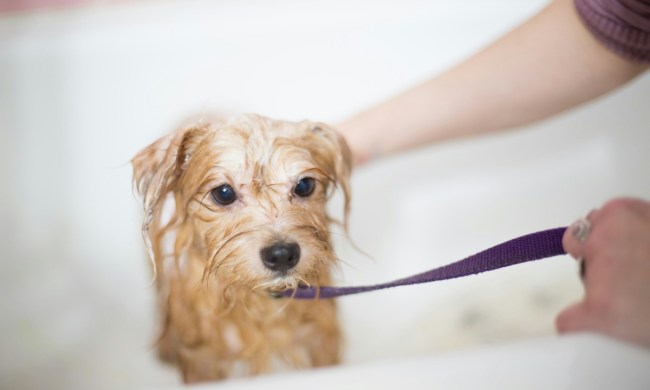Pay attention, pet parents, there’s another dog food recall you need to know about. Fortunately, the manufacturer detected the problem quickly, and there are no known pet illnesses due to the affected products.
On October 1, 2021, the U.S. Food and Drug Administration (FDA) announced a voluntary recall of over 5,500 cases of Fromm Family Shredded Entrée canned dog food due to possible elevated levels of vitamin D. Although the FDA knew of and announced the recall, they did not issue it (make it mandatory). Fromm’s statement reads, “We have identified and isolated the error, and in addition to our existing safety process, we have put corrective actions into place to prevent this from happening again.”
Although the company is taking action, there is still a lot that dog owners should know, including what products to look out for and what to do if you find any in your pantry. Here’s what you need to know about the Fromm dog food recall.
What dog foods are being recalled?
Only one line of Fromm canned dog foods is being recalled: the Four-Star Shredded Entrée 12-ounce cans. These cans are sold in a 12-pack in pet stores around the United States, and they all have a best-by date of August 2024 (via FDA). These are the recalled products:
- Four-Star Shredded Beef in Gravy Entrée food for dogs, 12 cans per case, 11877, UPC 7270511876
- Four-Star Shredded Chicken in Gravy Entrée food for dogs, 12 cans per case, 11881, UPC 7270511880
- Four-Star Shredded Pork in Gravy Entrée food for dogs, 12 cans per case, 11879, UPC 7270511878
- Four-Star Shredded Turkey in Gravy Entrée food for dogs, 12 cans per case, 11883, UPC 7270511882
Why are Fromm Family canned dog food products being recalled?
Fromm Family Foods recalled the above products due to a possibility of excess vitamin D. At this time, no incidents of canine illness or health complications from consuming these foods have been reported.
Fromm’s announcement in an FDA release says that “the recall was initiated after we discovered, through our own analysis, that these products may contain elevated levels of Vitamin D. We have identified and isolated the error, and in addition to our existing safety process, we have put corrective actions into place to prevent this from happening again.”
Risks of vitamin D
While some vitamin D can help strengthen a dog’s muscles and heart, too much can be harmful or even fatal. This is because vitamin D cannot be excreted through urine — instead, it is stored in fat or the liver (via FDA).
Vitamin D toxicity can occur when a dog ingests too much of the vitamin. According to the FDA, symptoms may include:
- Vomiting
- Lethargy
- Extreme thirst
- Excess urination
- Drooling
- Weight loss
Dogs of any size can be affected by an excess of vitamin D. Symptoms can build up over days or weeks, or they can appear in a matter of hours in extreme cases. If you’re concerned that your dog may be suffering from vitamin D toxicity, consult your veterinarian right away to receive the best advice.
What pet parents need to do
All dog owners, shelter managers, and pet food store workers should double-check their shelves for any of the affected products. If any are found, notes the FDA, return all cans to the retailer where you purchased them for safe disposal.
If you had the products in your home, keep an eye on your dog for any signs and symptoms of renal failure — or any other health complications of vitamin D toxicity. Whether or not your dog is showing symptoms, you can always give your veterinarian, or even the ASPCA Animal Poison Control Center, a call.
The phone number for the ASPCA Animal Poison Control Center is 888-426-4435. They are available 24 hours a day, every day of the year.
If you don’t have any of the recalled products in your home, you should be in the clear. Since other Fromm Family foods have already been tested for vitamin and ingredient levels, other products from this brand will be distributed normally. As a pet parent, it always helps to be in the know, so stay up to date on this recall and any others you may hear about.







